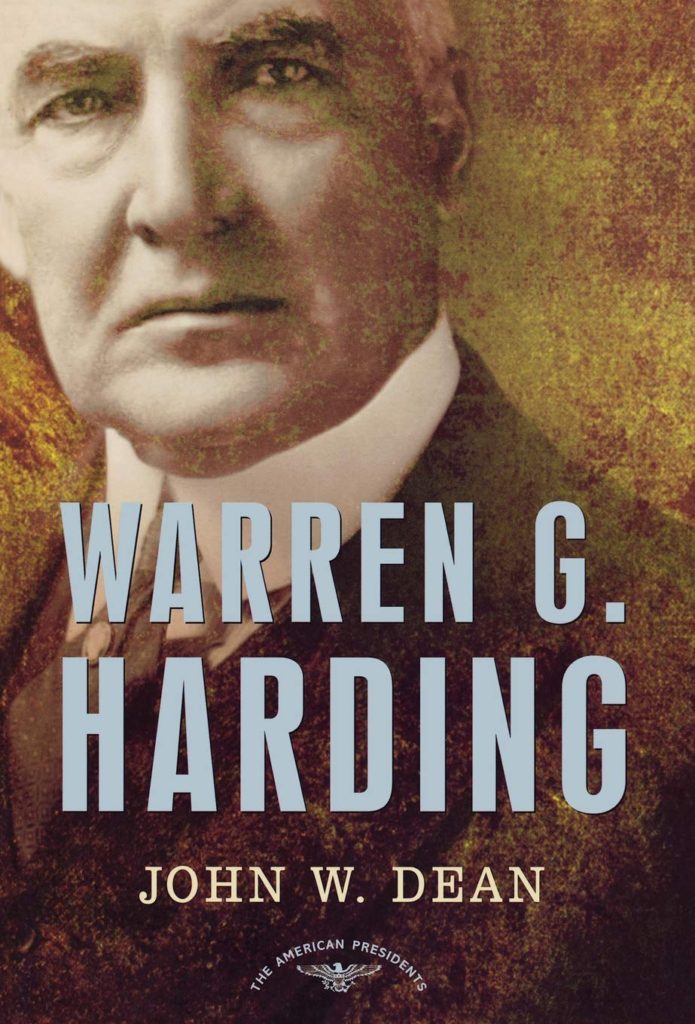“I never find myself done. I never find myself with my work complete. I don’t believe there is a human being who can do all the work there is to be done in the President’s office. It seems as though I have been President for twenty years.”
Warren Harding, one year into his presidency
For every person that tries to tell me that Donald Trump is a unique and special butterfly, uttering things no one ever has and controlling the populace in ways as yet unseen, I respond the same way. Read a book! Akin to the Andrew Johnson sampler platter from a few articles ago, I submit the following:
- An excerpt from the writings of a savvy media man – “[We Must] make sure our own house is in perfect order before we attempt the miracle of Old World stabilization. Call it selfishness or nationality if you will, I think it an inspiration to patriotic devotion – to safeguard America first, to stabilize America first, to prosper America first, to think of America first, to exalt America first, to live for and revere America first.”
- Gave a tax cut to the rich, encouraged by several extremely wealthy members of his Cabinet that doing so would stimulate the economy.
- A biographer said the presidency was won because of the “ability to give voice to the dream of the rural past by the promise of returning to normal times.”
- And lastly, on world trade – “tariff protection as a means of dealing with foreign competition had different consequences, for the United States was no longer a debtor nation. Rather the United States had become the world’s chief creditor and its economy relied greatly on its exports…tariff protectionism was a potentially dangerous game.”
As you’ve already figured out, those bullet points aren’t from 2020. They’re from 1920. Warren G. Harding had more differences that similarities to the 45th president, but my point stands. There are formulas for winning public office and they are used often and to great effect.
The most entertaining thing about reading this book had nothing to do with Warren Harding. Some grammar pedant who checked out the book before I did took author John W. Dean’s split infinitives to task. The disgruntled editor underlined EVERY INSTANCE in the book, including one point where they wrote, “WOW! You even managed to split an adjective!” They were apparently also troubled by Dean’s many folksy sayings, underlining all of those as well. (Ed. note: There was, however, a nice moment of hubris via a large “NO!” scribbled in the margins. Benjamin Harrison’s name was underlined in a list of presidents born in Ohio. Apparently this person was an English major but a history amateur; while Harrison spent his adult life in Indiana and is buried there, he was born in Ohio.)
Warren Harding wasn’t a very good president. But he was one hell of a newspaper man. Buying a local paper at 19 with some friends and a loan from his father, Warren G would soon bear the burden of the entire enterprise. Realizing the hard work to come, his buddies bailed, leaving Harding to buy the newsprint and ink, set the type, run the presses, write the articles and sell advertising. He built up the paper to a 6-page daily with an eight-page Sunday edition. While he kept his paper politically neutral, he started a weekly side hustle rag that was fiercely Republican so he could win government printing jobs. Later in life he couldn’t escape the scorn of Democratic leaning newspapers, especially upon being elected president, but his newsman background made him a darling with the press corps.
Even a president hovering in the near the nadir of scholarly rankings has his splashes. Harding signed the Budget and Accounting Act of 1921, giving the executive substantially more influence over the federal budgeting process. That year he also, more controversially, signed the Immigration Per Centum Act. The law sought to allay America fears of mass immigration after WWI by dramatically limiting immigration with caps by ethnicity, disproportionately curtailing groups without established communities already existing stateside. Lastly, and most impactful to the rural constituency he courted, the Capper-Volstead Act allowed small farmers to form cooperatives, a wholesale change to food markets across the country. This law is noted in Dean’s book as “agriculture’s Magna Carta.”
Harding also had a strong reputation with the black community. An abolitionist growing up, inarguably the boldest move of his political career was a speech to a (segregated) audience in Birmingham, AL. Ironically, yet intentionally, staged at Woodrow Wilson Park, Harding announced it was time for political and economic equality between the races. “When I suggest the possibility of economic equality between the races, I mean it precisely the same way and to the same extent that I would mean it if I spoke of equality of economic opportunity as between members of the same race. In each case I would mean equality proportional to the honest capacities and deserts of the individual. I would say let the black man vote when he is fit to vote; prohibit the white man voting when he is unfit to vote. Whether you like it or not, unless our democracy is a lie you must stand for that equality.” Many prominent blacks, including WEB DuBois, offered praise calling it the “most important utterance on the question [of race] by a President since Lincoln.” Sadly, advancing an agenda of equality was part of the legacy left unfulfilled by Harding’s death.
Warren Harding joined the short list of presidents to die in office. Two years into his term, Warren G. decided to undertake a “Voyage of Discovery” trip from DC across country and up to Alaska. The ardent traveler planned to proceed from there via train down the West Coast, board a ship in San Diego, sail down through the Panama Canal, stop into Puerto Rico and swing back home to Washington. Despite the First Lady’s years of poor health, Florence Harding decided to join her husband on the whirlwind tour rather than be separated for so long. The entourage was so worried for Florence’s health that they actually took a coffin along. As it turned out, they needed it for Warren. The train didn’t get past San Francisco before Harding’s bad ticker ended his presidency. If you were wondering why that golf course by the Bay is called Harding Park, there’s your memorial answer.
“I have no trouble with my enemies, I can take care of my enemies all right. But my damn friends…” Warren Harding’s legacy would be, like Grant’s, plagued by scandal. While he didn’t commit any frauds himself, Harding had the wrong people around him. His Veteran’s Bureau chief, Charles Forbes, sold surplus military supplies on the cheap and pocketed the profits. The big one was the Teapot Dome Scandal, where contracts were given out as favors at an oil field in Wyoming. The case took almost a decade to hear and Albert Fall, former Secretary of the Interior and primary favor-granter, became the first former Cabinet member to go to prison. Of course, there’s the scandal he couldn’t pin on his Cabinet; Harding had an off and on affair with his best friend’s wife for 15 years.
The first person to go directly from the Senate to the Oval Office, Warren Harding was popular, populist and partisan. People liked the guy, even if he didn’t really understand the policies he was helping usher along. An abolitionist with a rustic charm and ruddy complexion, Harding was sometimes even called the N word in his rural Ohio town, both by political opponents that didn’t like his anti-slavery views and by his future father-in-law, who didn’t want his daughter to marry the young news printer. One term presidents never get much love. One term presidents who suffer heart attacks halfway through their term, keep a circle of scandalous friends, are likeable but ignorant, and preside on the peaceful side of a war show up on trivia quizzes titled “The Most Obscure American Presidents.” In the right place at the right time, Warren Harding rose to the height of power because of his unabating love of God, country and the Republican Party. At least, that’s what they told him to say. And it worked.
Trivia
- Florence Harding was the first wife to vote for her husband as president
- First inaugural amplified to the crowd by speakers and also broadcast on the radio
- His father was a fifer in the Union army and once shook hands with Lincoln at the White House
- Created Department of Veteran Affairs
- Appointed William Howard Taft Chief Justice of the Supreme Court
- Pardoned socialist Eugene Debs
- On his first trip to Washington in 1888, he met with Ohio congressman (and future president) William McKinley, who introduced WGH to Theodore Roosevelt and Henry Cabot Lodge
- Cabinet – must have picked well, because the entire Cabinet was confirmed in less than ten minutes
- Among them, future president Herbert Hoover at Commerce and Andrew Mellon at Treasury, who at the time was the third richest person in America
Follow-Up Reading
- The Harding Era: Warren G. Harding and His Administration by Robert Murray
- The Shadow of Blooming Grove: Warren G Harding in His Times by Francis Russell
- The Teapot Dome Scandal: How Big Oil Bought the Harding White House and Tried to Steal the Country by Lanton McCartney

